GTA Commercial Solar Installation: Why It Is a Win-Win for Businesses
Dean Emerick
March 16, 2023

With rising electricity costs and growing environmental concerns, switching to solar power is a smart move for businesses in the Greater Toronto Area. It not only helps reduce energy bills but also allows companies to take advantage of government incentives and lower their carbon footprint. This article breaks down why investing in solar is a win-win for businesses in the GTA.
Key Takeaways
- Businesses across the Greater Toronto Area can cut energy costs by installing solar panels, helping offset rising electricity prices while taking advantage of available government incentives.
- Solar energy supports environmental sustainability by cutting down greenhouse gas emissions, improving air quality, and helping build a cleaner future for local communities.
- Investing in solar power can boost a company’s reputation, strengthen community connections, and even create job opportunities, all contributing to a positive social impact and higher employee satisfaction.
Cost Savings with Solar Power
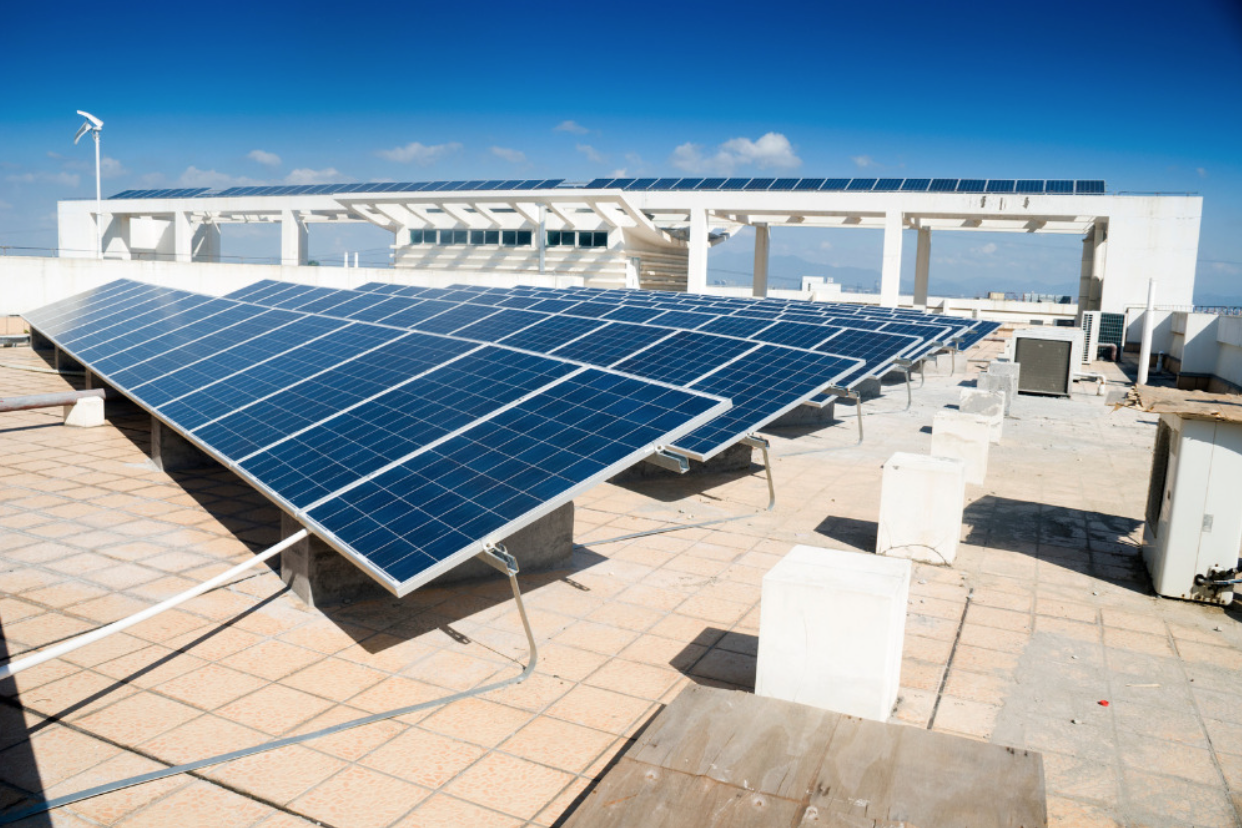
One of the most compelling reasons for businesses to install solar panels is the significant cost savings they can achieve. In Ontario, where electricity costs are expected to rise significantly, generating your own electricity with solar panels can substantially reduce energy expenses over time. Installing solar panels allows businesses to reduce electricity bills and potentially earn financial benefits through net metering by selling excess electricity back to the grid.
The financial advantages of solar power extend beyond just monthly savings on energy bills and include:
- Government incentives and rebates that make the initial investment more affordable
- Increased property value
- Potential income from selling surplus electricity back to the grid
With the abundance of sunshine hours in the GTA, solar power is a viable and efficient energy solution for local businesses.
Reduced Electricity Bills
Businesses in Ontario face rising electricity costs, with an average annual increase of 6.3% expected in the near future. Installing solar panels allows businesses to:
- Generate their own electricity, significantly reducing dependence on the provincial grid
- Achieve substantial savings on electricity costs
- Lower electricity bills through the self-generation of energy
- Provide a buffer against fluctuating energy prices
Advancements in solar technology have made solar panels more efficient and affordable, further enhancing the cost savings for businesses. Producing their own energy allows businesses to store excess energy for off-peak use or sell it back to the grid, maximizing financial benefits.
The long-term savings from reduced electricity bills make solar power an attractive investment for businesses looking to control energy costs and achieve long-term cost savings.
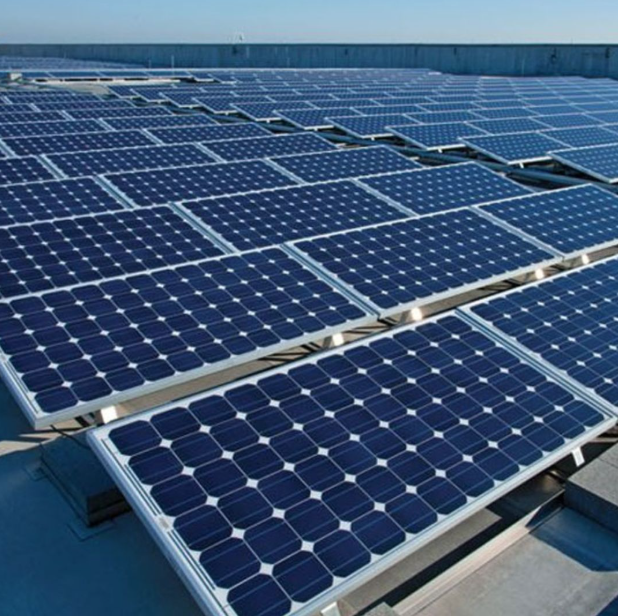
Government Incentives and Rebates
Various incentives and rebates are available to support solar panel installations, making them more financially viable for businesses. In Ontario, factors such as geolocation, incentive packages, and the availability of qualified installers influence the cost of installing solar panels. Utilizing these incentives can significantly reduce the upfront costs associated with solar installations for businesses.
Taking advantage of government incentives not only lowers initial expenses but also contributes to long-term savings and financial benefits, creating a win-win for businesses. These incentives are designed to promote the adoption of sustainable energy sources and make it easier for businesses to pay for the transition to solar power, saving for the future.
The financial support from the government is a crucial factor in making solar installations accessible and attractive to commercial building owners.
Long-Term Financial Benefits
Investing in solar panels can enhance property value and provide potential income from selling surplus electricity back to the grid. Properties equipped with solar panels are attractive to real estate buyers, as they save money on energy costs over time. This increase in property value is often expected from businesses that utilize solar technology, making it a lucrative investment.
Solar farms can be profitable, with the potential for significant earnings depending on location and installation costs. Opting for high-quality solar panels and contractors that offer warranties ensures reliability and boosts long-term investment value.
The substantial savings on energy bills and the potential for additional income make solar panels a smart financial decision for businesses looking to invest in their future.
Environmental Impact of Commercial Solar Panels
Commercial solar panels play a crucial role in reducing the environmental impact of businesses. Solar energy is a clean and sustainable source that significantly reduces greenhouse gas emissions compared to fossil fuel energy sources. By adopting solar power, businesses contribute to combating climate change and promoting a healthier environment.
The environmental benefits of solar power extend beyond reducing emissions. Solar energy technologies do not emit air pollution or greenhouse gases during operation, thus improving air quality. This cleaner energy solution supports sustainability and helps businesses in the Greater Toronto Area transition to a green economy.
The positive environmental impact of solar panels makes them an essential component of a sustainable future.

Reducing Greenhouse Gas Emissions
Solar energy helps reduce carbon dioxide emissions by replacing conventional electricity sources like coal and natural gas. Switching to solar energy allows businesses to significantly reduce their carbon footprint and lower carbon emissions. This transition to green energy sources is vital in the fight against climate change.
The reduction in carbon gas emissions also leads to better air quality, which can decrease respiratory issues and other health problems related to air pollution. The environmental benefits of solar power are clear: it is an efficient and sustainable energy source that supports a healthier planet and a sustainable future.
Sustainable Future
Solar power plays a critical role in promoting a sustainable future. Federal and state incentives help reduce the upfront costs associated with solar panel installations for businesses, making them more accessible. These incentives, along with options like solar leases and power purchase agreements, ease the financial burden of solar installations and encourage broader adoption.
Businesses that invest in solar power contribute to long-term environmental benefits, such as reducing greenhouse gas emissions and supporting renewable energy sources. Generating their own energy helps a business achieve energy independence and reduce reliance on fossil fuels.
This shift towards green energy is essential for creating a sustainable and resilient future.
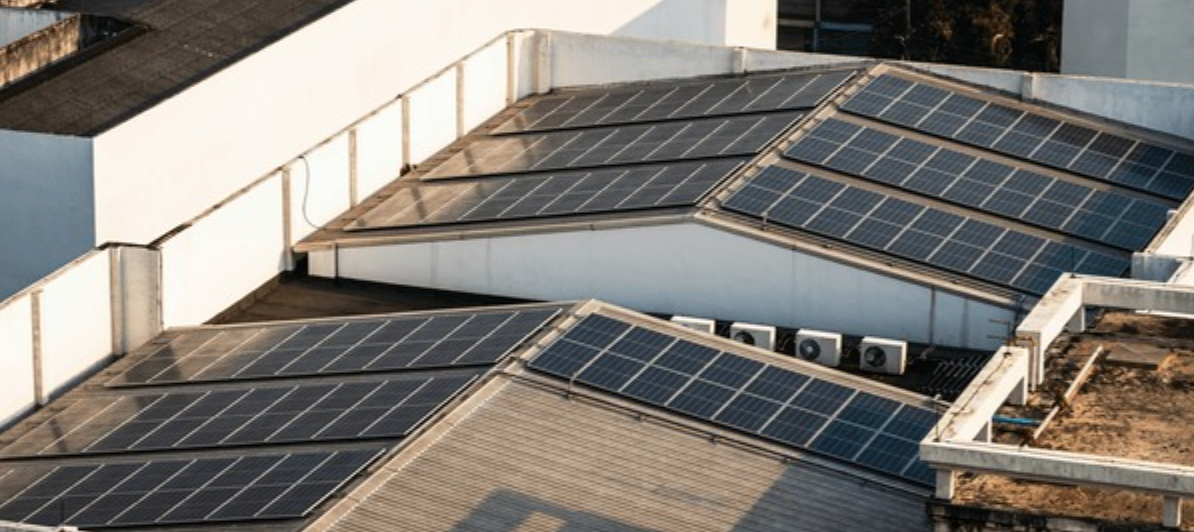
Improved Air Quality
Solar energy systems lead to cleaner air by minimizing harmful emissions, resulting in better health for residents. Transitioning to solar energy can significantly decrease the incidence of respiratory issues related to air pollution. The improved air quality is a direct result of reduced carbon emissions and the elimination of pollutants associated with fossil fuel energy sources.
The environmental benefits of solar energy extend to the well-being of the community. Reducing harmful emissions with solar panels leads to a healthier living environment and better public health outcomes. The positive impact on air quality is yet another reason why businesses should consider investing in solar power.
Social and Community Benefits
Commercial solar installations have a positive impact on the surrounding community and society. They contribute to healthier living environments and enhanced community wellbeing. Community solar initiatives can lead to better health outcomes by reducing reliance on fossil fuels and improving air quality.
Beyond the environmental benefits, solar installations foster a greater sense of community involvement among employees and can be integrated into agricultural operations, providing economic and environmental benefits. The social benefits of solar energy are far-reaching, enhancing public health and fostering stronger community ties.
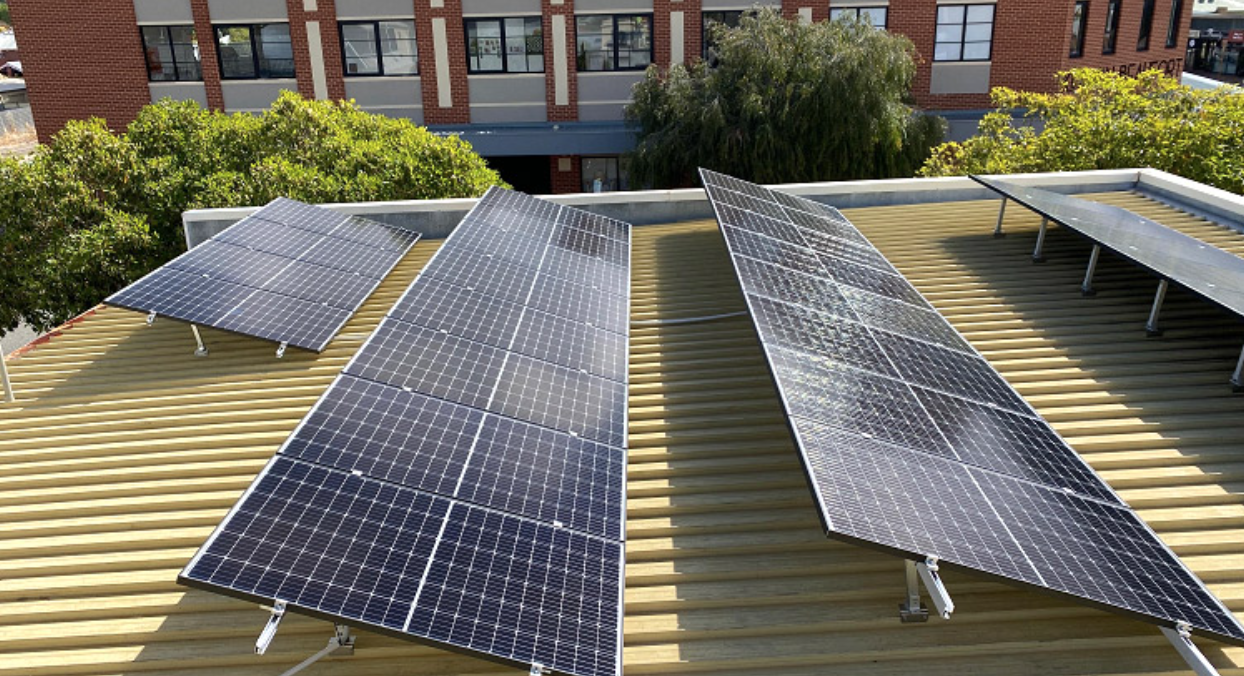
Enhanced Public Image
Installing solar panels can significantly improve a business’s public image as it showcases a commitment to environmental responsibility. Companies that adopt solar energy are perceived as responsible environmental stewards, which enhances their reputation. This commitment to sustainability can set businesses apart from their competitors and provide a competitive advantage.
Overall, businesses investing in solar energy benefit from an enhanced brand image, improving their relationship with customers and the community. The positive public perception can lead to increased customer loyalty and attract more environmentally conscious clients.
Job Creation and Employee Satisfaction
Investments in solar energy can generate job opportunities across various sectors, enhancing employee morale and retention. Key points include:
- The solar sector in Ontario has generated over tens of thousands of jobs in the last 2 decades.
- Projections are estimated to reach even higher in the future.
- The shift to solar energy opens job opportunities in green industries.
- This shift positively affects employee morale and job retention.
Investing in solar energy increases morale, improves job satisfaction, and enhances retention rates. Employees feel a sense of pride working for a company committed to sustainability and environmental responsibility. This positive work environment can lead to a more motivated and engaged workforce.
Stronger Community Ties
Adopting solar energy can foster stronger community ties by encouraging collaboration among government, local businesses, and non-profits. Community solar projects can bring together diverse groups to work towards a common goal of sustainability and environmental stewardship, reflecting a growing interest in these initiatives.
These collaborations can lead to innovative solutions and shared resources, benefiting the entire community. The sense of unity and shared purpose strengthens community bonds and promotes a collective effort toward a cleaner and more sustainable future.
Health Benefits of Solar Energy
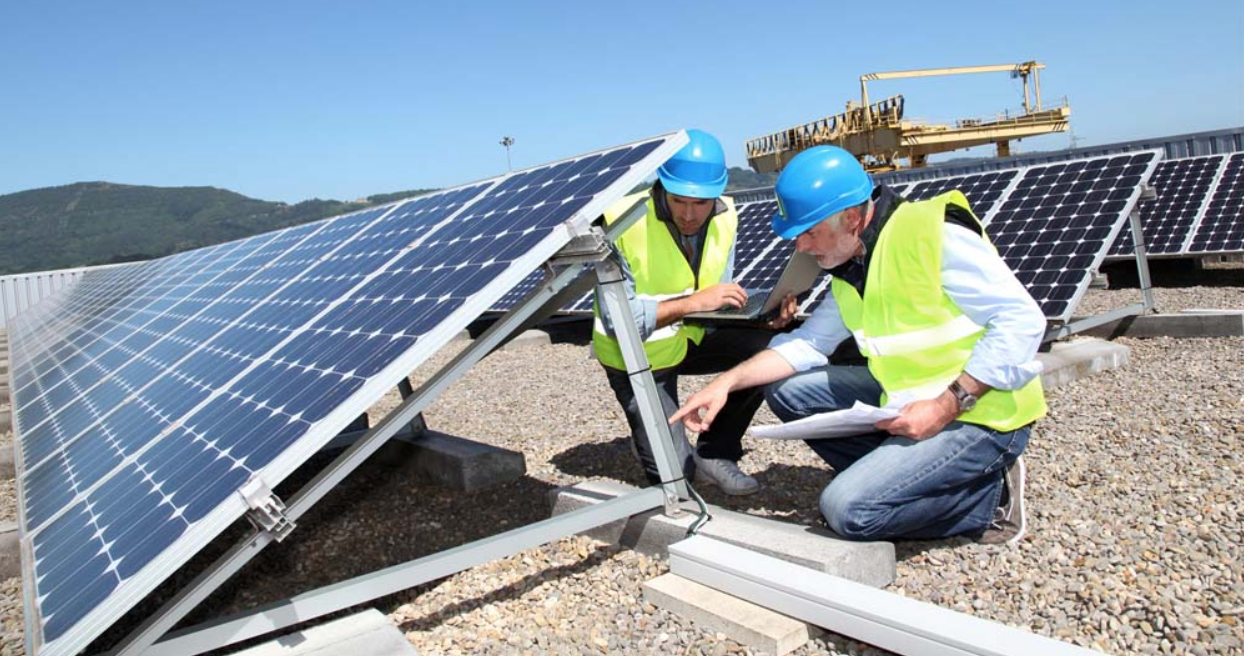
The health benefits of solar energy are significant and multifaceted. Solar energy reduces hazardous air pollutants, contributing to better public health outcomes. Solar energy installations positively impact the community’s health outcomes by creating a cleaner environment.
Moreover, solar power significantly reduces the risk of electrical accidents in the workplace. The overall health benefits of commercial solar installations reflect a positive impact on the well-being of both employees and the surrounding community.
Mental Health Benefits
Adopting solar energy has been shown to positively impact employees’ mental health. Solar energy adoption can elevate employee morale and mental health by fostering a sense of responsibility. Engaging in solar energy projects can enhance feelings of responsibility and purpose among employees.
Overall, the mental health benefits of solar energy adoption can lead to a more satisfied and motivated workforce. Employees who feel good about their company’s commitment to sustainability are more likely to be engaged and productive.
Noise Reduction
Solar panels operate silently, effectively reducing noise pollution in busy commercial areas. The sound level from solar panels during rainfall can be influenced by their installation angle, but overall, they contribute to a quieter environment compared to traditional energy sources.
The reduction in noise pollution is particularly beneficial in urban areas, where noise can be a significant issue. By installing solar panels, businesses contribute to a more peaceful and comfortable environment for their employees and the surrounding community.
Improved Physical Health
Solar installations are instrumental in enhancing air quality in communities. They reduce local air pollution and harmful emissions, leading to better physical health outcomes for the community. Improved air quality directly contributes to better physical health outcomes for the community.
The benefits of reduced air pollution reflect positively on public health and community well-being. By investing in solar energy, businesses can create a healthier environment for their employees and the broader community.
Choosing the Right Solar Panel Contractor
Selecting the right solar panel contractor is crucial for the success of your solar installation project. A reliable contractor will:
- Assess factors such as roof size, orientation, and shading to determine the suitability of solar panel placement.
- Consider the orientation and angle of the roof, noting that south-facing slopes typically yield the best results for solar panel efficiency.
- Bring knowledge and experience to ensure the solar installation meets industry standards and maximizes performance.
Additionally, it is important to consider the quality of the equipment being used. High-quality solar equipment ensures the longevity and efficiency of the solar system, reducing maintenance costs over time.
The contractor should have proper training on the specific products they offer and provide post-installation support to address any questions or concerns about the solar energy system. Excellent customer service and ongoing support are essential for maintaining the system’s performance and ensuring a smooth installation process.
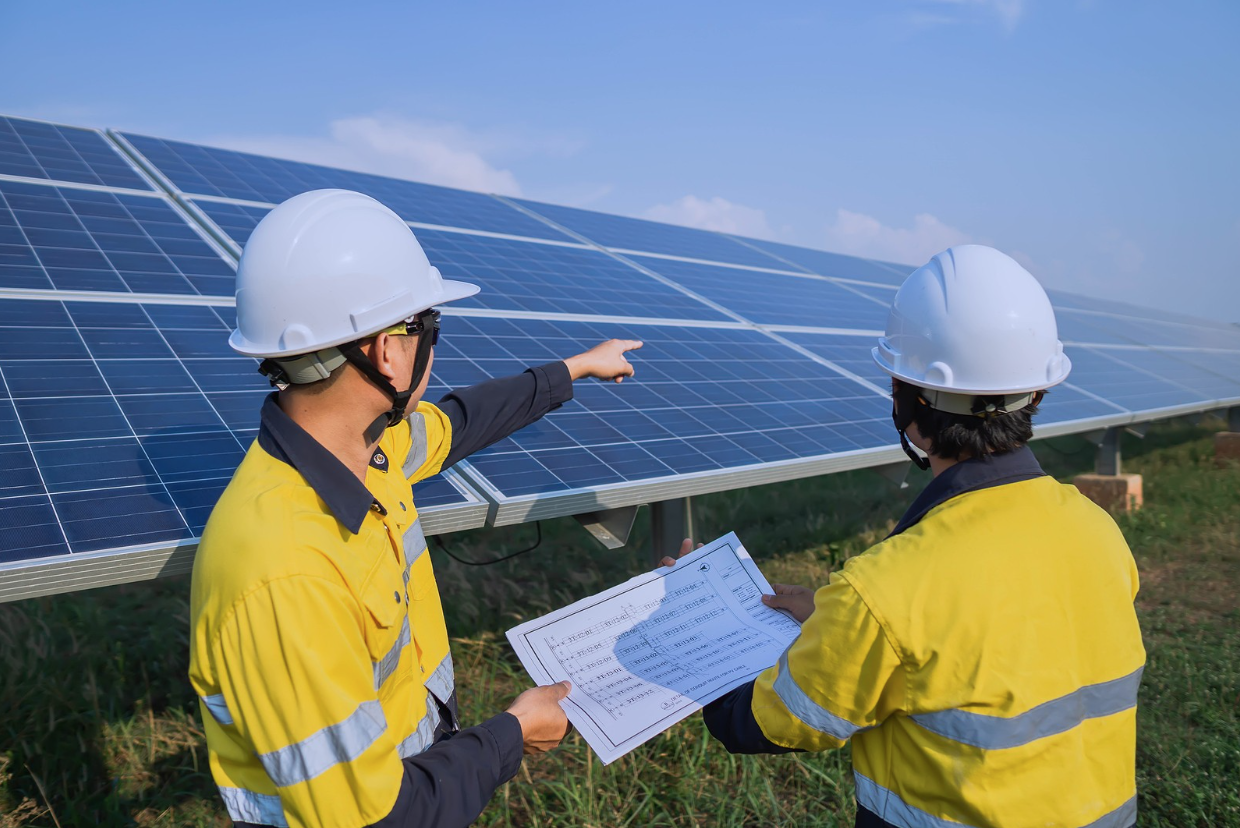
Licensing and Experience
Verifying that the contractor holds all necessary certifications and licenses specific to solar energy installations is crucial. Contractors should have specialized Canadian solar certifications to validate their expertise. These certifications ensure that the contractor has the knowledge and skills required to install solar panels correctly and efficiently.
Experience is another important factor to consider. A contractor with a proven track record of successful solar installations will be better equipped to handle any challenges that may arise during the project. Selecting a contractor with the right licensing and experience ensures the quality and reliability of the solar installation.
Quality of Equipment
Choosing high-quality solar equipment is essential for ensuring the longevity and efficiency of your solar system. Investing in reliable and efficient equipment can lead to better energy output and reduced maintenance costs over time. It is important to select a contractor who uses high-quality products and has proper training on the specific equipment they offer.
A knowledgeable contractor will ensure that your solar installation meets industry standards and maximizes performance. Prioritizing quality equipment and experienced contractors allows businesses to achieve long-term savings and optimal efficiency from their solar systems.
Customer Service
Customer service is a critical aspect of the solar installation process. A contractor who provides excellent customer service will ensure a smooth and efficient installation process, fostering trust and satisfaction. Regular checks on the system’s performance by a trained professional help maintain the efficiency and effectiveness of the solar installation.
Using a monitoring app set up by the installer can help ensure that your solar power system is installed to operate at its best over time. Post-installation support is crucial for addressing any questions or concerns that may arise, ensuring the long-term success of the solar energy system.
Selecting a contractor with a strong commitment to customer service ensures a seamless and positive solar installation experience.
Overcoming Challenges in Commercial Solar Installation
While the benefits of commercial solar installations are numerous, businesses may face certain challenges. One significant hurdle is the upfront cost, which can be mitigated through various financing strategies such as solar loans and leasing options. Proper financing options play a crucial role in making solar installations more affordable and accessible for businesses, allowing them to adopt green energy solutions without significant upfront investments.
Another challenge is ensuring the suitability of the space and roof for solar panel installations. Installers assess factors such as:
- The size of the building
- The direction the roof faces
- Shading from nearby structures
- Accessibility for maintenance
These factors help determine the viability of solar panel placement.
Additionally, securing necessary permits and ensuring adherence to local regulations is vital for the successful installation of solar panels. Addressing these challenges with experienced contractors and proper planning enables businesses to successfully transition to solar power.
Financing Options
Programs vary by province and are always up to date at SolrSolvr. Most businesses can access solar loans, which can be secured against the property or unsecured with higher interest rates. Leasing solar panels can help businesses avoid upfront costs and spread payments over time, making solar energy more accessible. Financing options play a crucial role in making solar installations more affordable for businesses, allowing them to adopt renewable energy solutions without significant upfront investments.
The availability of solar loans and leasing options significantly enhances the feasibility of solar energy for businesses, promoting broader adoption across the industry. By exploring these financing options, businesses can overcome the financial barriers to installing solar panels and enjoy the long-term benefits of renewable energy.
Space and Roof Suitability
Installers assess various factors to determine the suitability of solar panel installations, including:
- The size of the building
- The number of panels needed
- The direction the roof faces
- Shading from nearby structures
- Accessibility for maintenance
The orientation and angle of the roof significantly affect solar panel efficiency, with south-facing slopes typically yielding the best results.
Working with experienced contractors ensures that the space and roof are suitable for solar panel installations. Proper assessment and planning help maximize the efficiency and effectiveness of the solar system, ensuring long-term benefits and optimal performance.
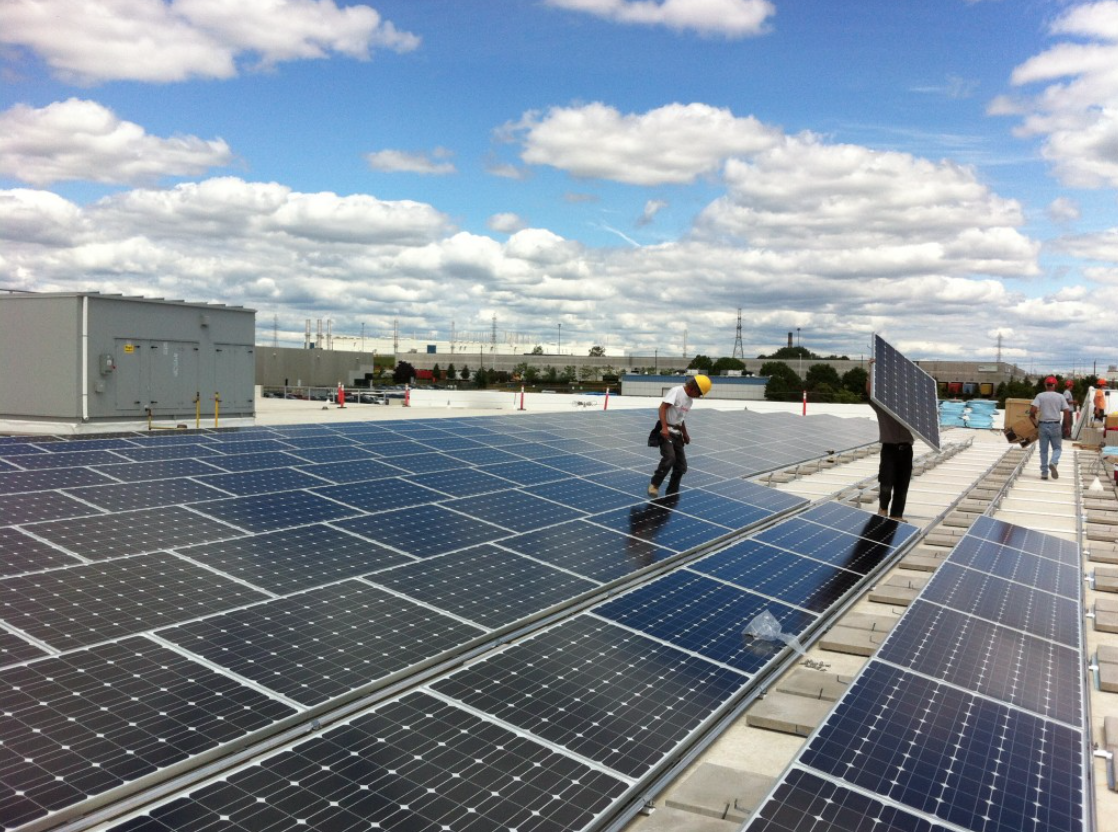
Regulatory Compliance
Securing necessary permits and ensuring adherence to local regulations is vital for the successful installation of solar panels. Businesses must investigate local zoning laws and secure the necessary permits for solar installations to comply with regulations. In Ontario, a Renewable Energy Approval (REA) is often required for solar projects, particularly for installations exceeding specific capacity thresholds.
Partnering with knowledgeable contractors helps businesses navigate the regulatory landscape and ensure compliance with all necessary regulations. This compliance is essential for the smooth and successful installation of solar systems, avoiding potential legal issues and ensuring the long-term viability of the project.
Summary
Commercial solar installations in the Greater Toronto Area offer a wide range of benefits for businesses. From cutting energy costs and accessing government incentives to improving air quality and reducing carbon emissions, solar power is a practical and forward-thinking choice. It also helps strengthen your brand image, supports local job creation, and builds deeper connections within the community.
The success of any solar project depends on working with the right contractor, selecting reliable equipment, and planning ahead for financing and logistics. With the right approach, businesses can tap into clean, renewable energy while setting themselves up for long-term growth and sustainability. Now is the time to invest in solar and make a meaningful difference for your business and the planet.
Frequently Asked Questions
How can solar panels reduce electricity bills for businesses?
Solar panels enable businesses to generate their own energy, reducing reliance on the grid and lowering the high electricity costs. This independence can result in substantial savings on energy bills over time.
What government incentives and rebates are available for solar panel installations?
Government incentives and rebates for solar panel installations enhance financial viability, offering financial support through tax credits, grants, and other programs designed to reduce upfront costs. It's essential to research local and federal options to maximize potential savings.
How do solar panels improve air quality?
Solar panels improve air quality by reducing harmful emissions, which enhances public health and contributes to a cleaner environment.
What should businesses consider when choosing a solar panel contractor?
Businesses must evaluate the contractor's licensing, experience, quality of equipment, and customer service to ensure a successful solar installation. Making these considerations can lead to a more efficient and reliable solar energy solution.
What financing options are available for solar installations?
Solar installations offer financing options such as solar loans and leasing, allowing businesses to mitigate upfront costs and spread payments over time, thereby enhancing accessibility to solar energy solutions.


.png)
